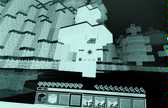

Identity Theft. Owen Thor Walker, an 18-year-old New Zealander, was a member of an international hacking group that infected at least 1.3 million computers and caused losses upward of $20 million.
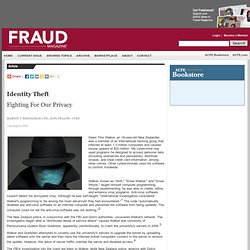
His cybercrime ring used programs he designed to access personal data (including usernames and passwords), distribute viruses, and steal credit card information, among other crimes. Other cybercriminals used his software to commit misdeeds. Practical legal articles from FindLaw New Zealand. More Articles like this in:Criminal LawScience & TechnologyIT & the Internet New Computer CrimesAuthor: Simpson Grierson The Love Bug virus, the Code Red worm, identity theft, denial of service attacks, hacking - cyber crime is increasingly impacting on our lives.
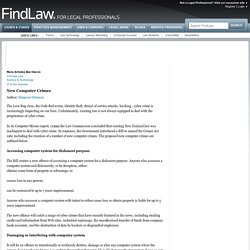
Unfortunately, existing law is not always equipped to deal with the perpetrators of cyber crime. In its Computer Misuse report, (1999) the Law Commission concluded that existing New Zealand law was inadequate to deal with cyber crime. Chapter 16 - Cyberspace Junk - NetHistory. Nailing Net Nasties Anyone who tries to create an Alsatia state would find themselves in breach of international law with the sanctions of the rest of the world ganged up against them bringing a sense of security to our domestic society for international electronic commerce.
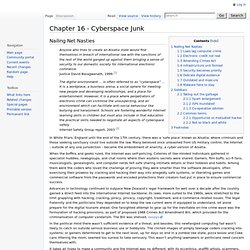
Justice David Baragwanath, 1999.[1] The digital environment … is often referred to as “cyberspace” … It is a workplace, a business arena, a social sphere for meeting new people and developing relationships, and a place for entertainment. However, it is a place where perpetrators of electronic crime can victimise the unsuspecting, and an environment which can facilitate anti-social behaviour like bullying and harassment. Schools are fostering wonderful Internet learning skills in children but must also include in that education the practical skills needed to negotiate all aspects of cyberspace safely.
When the boffins and geeks ruled, the Internet was self-policing. THE LEGAL FRAMEWORK. No special penal legislation Federal legislation: The Cybercrime Act 2001 amended the Criminal Code Act 1995 to replace existing oudated computer offences. 478.1 Unauthorised access to, or modification of, restricted data (1) A person is guilty of an offence if: (a) the person causes any unauthorised access to, or modification of, restricted data; and (b) the person intends to cause the access or modification; and (c) the person knows that the access or modification is unauthorised; and (d) one or more of the following applies: (i) the restricted data is held in a Commonwealth computer; (ii) the resticted data is held on behalf of the Commonwealth; (iii) the access to, or modification of, the resticted data is caused by means of a telecommunications service.
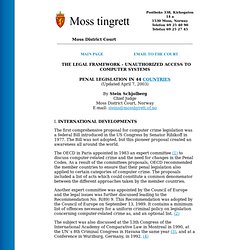
Penalty: 2 years imprisonment. (2) Absolute liability applies to paragraph (1)(d) (3) In this section: restricted data means data. (a) held in a computer; and Privacy Act 2000, effective as of January 1, 2000: Section 10: § 52. . §1. . §2. . §4. . §5. . §6. Law and technology. A man has been pleaded guilty in the Queenstown District Court of intentionally accessing a computer system at the hostel he was staying at: Schiavini had used his computer to access the wireless network at the hostel, where he was staying, and gained further access to the internal reservation system.
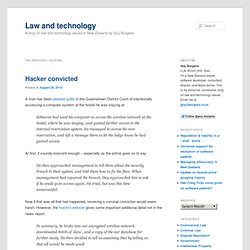
He managed to access his own reservation, and left a message there to let the lodge know he had gained access. At first, it sounds innocent enough – especially as the article goes on to say: He then approached management to tell them about the security breach in their system, and told them how to fix the flaw. When management had repaired the breach, they approached him to ask if he could gain access again.
Now if that was all that had happened, receiving a criminal conviction would seem harsh. Cyber crime: Hackers and phishers target Kiwis. Rising use of internet for online banking, shopping and social networking increases vulnerability to scammers.
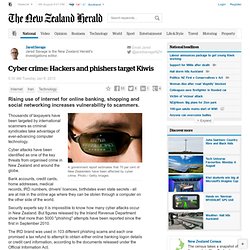
Thousands of taxpayers have been targeted by international scammers as criminal syndicates take advantage of ever-advancing computer technology. Cyber attacks have been identified as one of the key threats from organised crime in New Zealand and around the globe. Bank accounts, credit cards, home addresses, medical records, IRD numbers, drivers' licences, birthdates even state secrets - all are at risk in the online age where they can be stolen through a computer on the other side of the world.
Security experts say it is impossible to know how many cyber attacks occur in New Zealand. But figures released by the Inland Revenue Department show that more than 5000 "phishing" attempts have been reported since the first in September 2010. "When hackers find these computers, they hack in, install web server software and load up malicious pages. "The list is endless," said Mr Stokes. Electronic crime – what it is and how to report it. Electronic crime, also known as e-crime or cybercrime, refers to criminal activity that involves the Internet, a computer or other electronic devices.
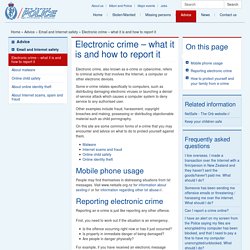
Some e-crime relates specifically to computers, such as distributing damaging electronic viruses or launching a denial-of-service attack which causes a computer system to deny service to any authorised user. Other examples include fraud, harassment, copyright breaches and making, possessing or distributing objectionable material such as child pornography.
On this site are some common forms of e-crime that you may encounter and advice on what to do to protect yourself against them. Mobile phone usage People may find themselves in distressing situations from txt messages. Report-by-Privacy-Commissioner-on-Supplementary-Order-Paper-No.-85-to-the-Crimes-Amendment-Bill-No.6-2000.pdf.